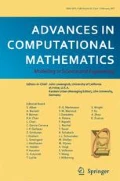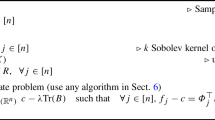Abstract
We study multivariate integration and approximation for various classes of functions of d variables with arbitrary d. We consider algorithms that use function evaluations as the information about the function. We are mainly interested in verifying when integration and approximation are tractable and strongly tractable. Tractability means that the minimal number of function evaluations needed to reduce the initial error by a factor of ɛ is bounded by C(d)ɛ−p for some exponent p independent of d and some function C(d). Strong tractability means that C(d) can be made independent of d. The ‐exponents of tractability and strong tractability are defined as the smallest powers of ɛ{-1} in these bounds.
We prove that integration is strongly tractable for some weighted Korobov and Sobolev spaces as well as for the Hilbert space whose reproducing kernel corresponds to the covariance function of the isotropic Wiener measure. We obtain bounds on the ‐exponents, and for some cases we find their exact values. For some weighted Korobov and Sobolev spaces, the strong ‐exponent is the same as the ‐exponent for d=1, whereas for the third space it is 2.
For approximation we also consider algorithms that use general evaluations given by arbitrary continuous linear functionals as the information about the function. Our main result is that the ‐exponents are the same for general and function evaluations. This holds under the assumption that the orthonormal eigenfunctions of the covariance operator have uniformly bounded L∞ norms. This assumption holds for spaces with shift-invariant kernels. Examples of such spaces include weighted Korobov spaces. For a space with non‐shift‐invariant kernel, we construct the corresponding space with shift-invariant kernel and show that integration and approximation for the non-shift-invariant kernel are no harder than the corresponding problems with the shift-invariant kernel. If we apply this construction to a weighted Sobolev space, whose kernel is non-shift-invariant, then we obtain the corresponding Korobov space. This enables us to derive the results for weighted Sobolev spaces.
Similar content being viewed by others
References
N. Aronszajn, Theory of reproducing kernels, Trans. Amer. Math. Soc. 68 (1950) 337-404.
Z. Ciesielski, On L´evy's Brownian motion with several-dimensional time, in: Lecture Notes in Mathematics, Vol. 472, eds. A. Dold and B. Eckman (Springer, New York, 1975) pp. 29-56.
F.J. Hickernell, Quadrature error bounds with applications to lattice rules, SIAM J. Numer. Anal. 33 (1996) 1995-2016, corrected printing of sections 3-6 in ibid. 34 (1997) 853-866.
F.J. Hickernell, Lattice rules: How well do they measure up?, in: Pseudo-and Quasi-Random Point Sets, eds. P. Hellekalek and G. Larcher, Lecture Notes in Statistics, Vol. 138 (Springer, New York, 1998) pp. 109-166.
H.-H. Kuo, Gaussian Measures in Banach Spaces, Lectures Notes in Mathematics, Vol. 463 (Springer, Berlin, 1975).
J. Matoušek, The exponent of discrepancy is at least 1:0669, J. Complexity (1998) 448-453.
G.M. Molchan, On some problems concerning Brownian motion in L´evy's sense, Theory of Probab. Appl. 12 (1967) 682-690.
E. Novak, Intractability results for positive cubature formulas and extremal problems for trigonometric polynomials, J. Complexity 15 (1999) 299-316.
A. Papageorgiou and J.F. Traub, Beating Monte Carlo, Risk 9(6). (1996) 63-65.
S.H. Paskov and J.F. Traub, Faster valuation of financial derivatives, J. Portfolio Management 22 (1995) 113-120.
I.H. Sloan and S. Joe, Lattice Methods for Multiple Integration (Oxford University Press, Oxford, 1994).
I.H. Sloan and H. Wo´zniakowski, When are quasi-Monte Carlo algorithms efficient for high dimensional integrals?, J. Complexity (1998) 1-33.
E.M. Stein, Singular Integrals and Differentiable Properties of Functions (Princeton University Press, Princeton, 1970).
C. Thomas-Agnan, Computing a family of reproducing kernels for statistical applications, Numer. Algorithms 13 (1996) 21-32.
J.F. Traub, G.W. Wasilkowski and H. Wo´zniakowski, Information-Based Complexity (Academic Press, New York, 1988).
G. Wahba, Spline Models for Observational Data, SIAM-NSF Regional Conference Series in Appl. Math., Vol. 59 (SIAM, Philadelphia, PA).
G.W. Wasilkowski, Integration and approximation of multivariate functions: Average case complexity with isotropic Wiener measure, Bull. Amer. Math. Soc. 28 (1993) 308-314; full version in J. Approx. Theory 77 (1994) 212-227.
G.W. Wasilkowski and H. Wo´zniakowski, Explicit cost bounds of algorithms for multivariate tensor product problems, J. Complexity 11 (1995) 1-56.
G.W. Wasilkowski and H. Wo´zniakowski, On tractability of path integration, J. Math. Phys. 37(4) (1996) 2071-2088.
G.W. Wasilkowski and H. Wo´zniakowski, The exponent of discrepancy is at most 1.4778..., Math. Comp. 66 (1997) 1125-1132.
G.W.Wasilkowski and H. Wo´zniakowski, Weighted tensor product algorithms for linear multivariate problems, J. Complexity 15 (1999) 402-447.
H. Wo´zniakowski, Average case complexity of linear multivariate problems. Part 1; Theory, Part 2: Applications, J. Complexity 8 (1992) 337-372; 373-392.
H. Wo´zniakowski, Tractability and strong tractability of linear multivariate problems, J. Complexity 10 (1994) 96-128.
Author information
Authors and Affiliations
Rights and permissions
About this article
Cite this article
Hickernell, F., Woźniakowski, H. Integration and approximation in arbitrary dimensions. Advances in Computational Mathematics 12, 25–58 (2000). https://doi.org/10.1023/A:1018948631251
Issue Date:
DOI: https://doi.org/10.1023/A:1018948631251



